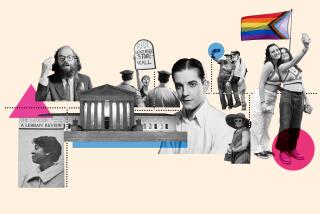1987 Could Be the Year Showing a Slowdown in AIDS Spread--If . . .
- Share via
Denial is a wonderful survival device. It allows us to drive a car every day without believing that we will be among the tens of thousands of people who die each year in car accidents. Denial also is an insidious device of self-destruction. It allows people to continue with habits hazardous to their health in the belief that they will remain on the right side of the odds. In the past few years, denial has been working overtime against efforts to educate people about the AIDS epidemic.
Most Americans are heterosexual; most Americans do not use injectable drugs. AIDS is a “gay disease,” most Americans say. Or “people who shoot up are only killing themselves; what’s it to me?”
This is what it means to us all:
Between 1 million and 1 1/2 million Americans are now carrying the AIDS virus; even if the spread of the virus stopped today, it is believed that 250,000 to 750,000 would come down with the full-blown disease within 10 years.
Of course, the virus will not be stopped in the foreseeable future. In fact, what makes this epidemic so frightening is the researchers’ belief that the AIDS virus stays in the body--and keeps that person potentially infectious--for life. This characteristic makes AIDS unique in deadliness. In the two epidemics that Americans remember vividly, influenza and polio, those stricken were infectious for only a short time.
Even more pertinent to the “so what” crowd, at present most AIDS carriers are unaware that they are infected. So every unprotected sexual encounter outside a longstanding monogamous relationship is a major gamble.
In 1986 every key health authority in the United States addressed the AIDS crisis, culminating with Surgeon General C. Everett Koop’s extraordinary and welcome statement, which made excellent recommendations about AIDS. Still, regrettably, 1986 will not be remembered as the year when society as a whole took the crisis seriously enough to confront it realistically and effectively. What if we managed to make 1987 different? This is what would happen:
We would stop dividing people with AIDS into “innocent victims” (children and blood-product recipients) and, therefore by implication, “guilty ones” (gay and bisexual men, intravenous drug users and “promiscuous” heterosexuals).
We would accept that homosexuality is as much a part of one’s makeup as left-handedness and stop attributing this tragic epidemic to God’s wrath. (Why are lesbians virtually AIDS-free if AIDS were divine retribution for homosexuality?)
The gay community would recognize that the AIDS virus represents a greater threat to its survival than civil-rights attacks do. A community commitment by gay men and lesbians to help prevent the spread of the virus would foster individual and collective responsibility, which would then be helpful in resisting civil-rights attacks as well.
We would spend money to help intravenous drug users quit their habits, not only because we want to prevent the spread of AIDS to their sexual partners and unborn children but also because we want to prevent them, as people, from getting this terrible disease.
Physicians would overcome their difficulties in dealing with sexual matters and would learn how to determine which of their patients are at risk from AIDS and how to counsel them on minimizing that risk.
The media would recognize that the epidemic of AIDS does not fit into their customary handling of sex-related news. So they would provide regular, detailed, educational information about how the virus is and is not spread. And they would accept advertising and public-service announcements for condoms, which can help prevent not only unwanted pregnancies but the spread of the AIDS virus as well.
Parents would insist that schools begin the AIDS education programs recommended by the surgeon general.
President Reagan would acknowledge the seriousness of the epidemic and publicly support the recommendations of the surgeon general. The President would also advocate funding to accomplish those recommendations.
Politicians would overcome their reluctance to take the lead in AIDS funding for education and prevention, and would spend the money on those areas as well as for research and patient needs.
The Justice Department and Gov. George Deukmejian would recognize the reality and inappropriateness of employment discrimination against people having AIDS, and would work to oppose such discrimination.
Pre-paid health plans would recognize that this epidemic will severely affect them all. They would stop trying to “select out” potential AIDS clients, and would turn their efforts to preventive education and saving lives.
Hospitals and medical centers would have mandatory education programs for personnel to allay their fears about the disease and to improve medical care for people with AIDS.
Employers would initiate workplace programs concerning AIDS, whether or not they have employees diagnosed with the disease.
Black and Latino community leadership, including the church, would recognize that minorities are being affected out of proportion to their numbers in this country and would join the battle against AIDS.
Society would recognize that AIDS is unique, and would stop trying to make the disease fit established patterns and rules, since the virus will not behave as we want it to.
Americans would stop being able to have sex while being unable to talk about it. Explicit talk about sex would occur in the media, in the workplace, in the home and, most important, between two people about to have sex.
All people would show compassion and sensitivity to people with AIDS and stop blaming them for their disease.
If all this came to pass, 1987 would be known as the year the spread of the AIDS virus began to slow in the United States. Even then it would only be a start in the very long siege ahead of us.






